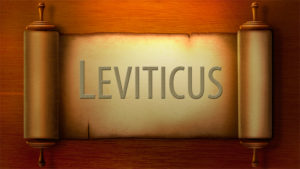 In order to grasp the significance of the events leading to the death of Aaron’s sons, Nadab and Abihu, we must consider the entire setting for this event. The Tabernacle had been erected and the Glory of the Lord had filled it. All the congregation of Israel witnessed this awesome heavenly event. Afterward, the Lord called Moses and commanded him concerning the offerings (Korban or approaches) which outlined how Israel was to approach the Lord. Next came the distinguishing of the priest from the common people (ordination). Moses dressed Aaron and his sons in their priestly attire and made sin, peace, gift and burnt offerings for them. He sprinkled them with the blood of the offerings and with the anointing oil. Aaron and his sons were not permitted to leave the tent of meeting for seven days, the days of consecration.
In order to grasp the significance of the events leading to the death of Aaron’s sons, Nadab and Abihu, we must consider the entire setting for this event. The Tabernacle had been erected and the Glory of the Lord had filled it. All the congregation of Israel witnessed this awesome heavenly event. Afterward, the Lord called Moses and commanded him concerning the offerings (Korban or approaches) which outlined how Israel was to approach the Lord. Next came the distinguishing of the priest from the common people (ordination). Moses dressed Aaron and his sons in their priestly attire and made sin, peace, gift and burnt offerings for them. He sprinkled them with the blood of the offerings and with the anointing oil. Aaron and his sons were not permitted to leave the tent of meeting for seven days, the days of consecration.
On the eight day, after being instructed by Moses, Aaron and his sons prepared to make offering for the sons of Israel. This was the first time Aaron and his sons acted in this capacity. When the “olah” was prepared and placed on the altar, fire came out from the Lord and consumed the offering. All the people saw this. They shouted and fell down on their faces. A “holy fire” had been kindled on the altar.
Evidently, following the seven days that Aaron and his sons were separated from the sons of Israel and from their families, they must have left the tent of meeting and returned to their families. They must have been in a celebratory mood from completing the days of consecration and having been greatly exalted before the congregation. From the comments made after the death of Nadab and Abihu, they must have gotten into the toddy at bit too much (Leviticus 10:9).
A part of their priestly duty was to place fire in their firepans and burn incense before the Lord. Later, we see the incense as representing the “prayer of God’s people” symbolically being placed in the presence of the Lord (Revelation 5:8). The fire that should have been used was from the supernatural burning on the altar which occurred when fire from the Lord had devoured the “olah” (burnt offering) which had just been made. We conclude that due to their intoxication, Nadab and Abihu must have placed something like burning coals from their home fire and carried it into the Holy Place. The fire of the Lord came out and consumed them. They died there. Their bodies were carried out by Levites who were chosen for that duty and they were buried outside the camp.
We learn an awesome lesson from this event. The Lord declared to Moses:
“By those who come near Me I will be treated as holy, and before all the people I will be honored” (Leviticus 10:2).
The Lord declares:
“Be holy, for I am holy” (Leviticus 11:44b)
As a follower of Messiah Jesus, I believe that we should take this message very seriously. We, as believers, confess that in Messiah Jesus we have been called to come near to the Lord, to know Him and to serve Him. I have no tolerance for false humility or fake honor, but I believe that when we come before the Lord in prayer or worship, we should do so exhibiting the deepest respect and honor to the Lord. I don’t believe in wearing such things as exalted religious robes, but I don’t believe we should be too casual either. Certainly, God is moved more by a loving, humble spirit than by our outward attire. I always think in these terms: if I were invited to attend an important function to honor some individual who had attained great fame or honor, would I come in jeans, t-shirt and shower shoes. No, I would dress appropriately for the occasion. In prayer and worship, we confess that we are appearing before the King of Kings, and the Lord of the Universe. Don’t come drunk and bring a coat and tie.